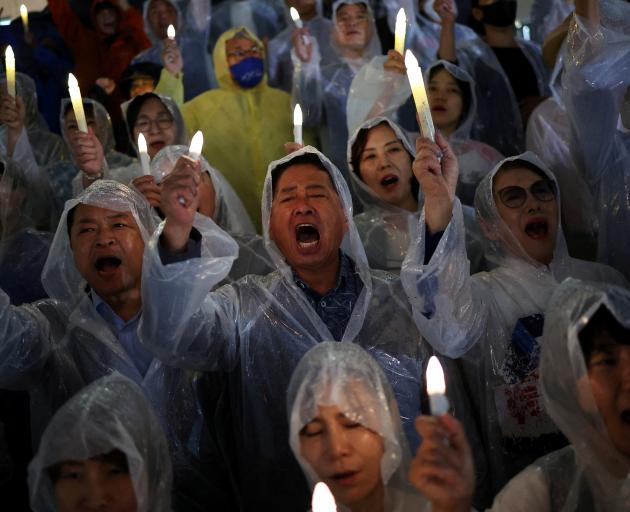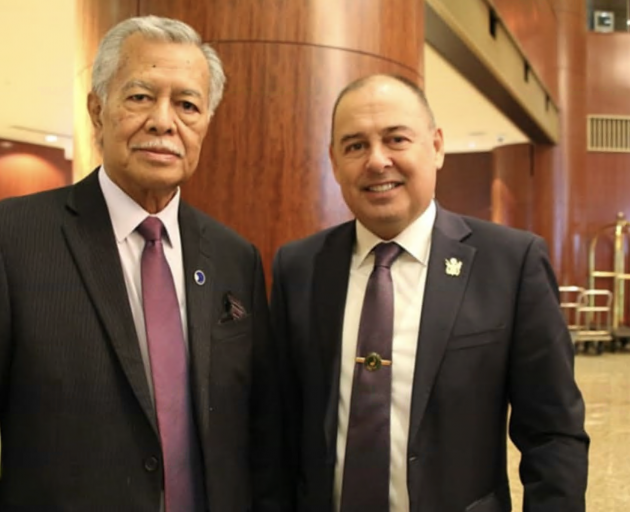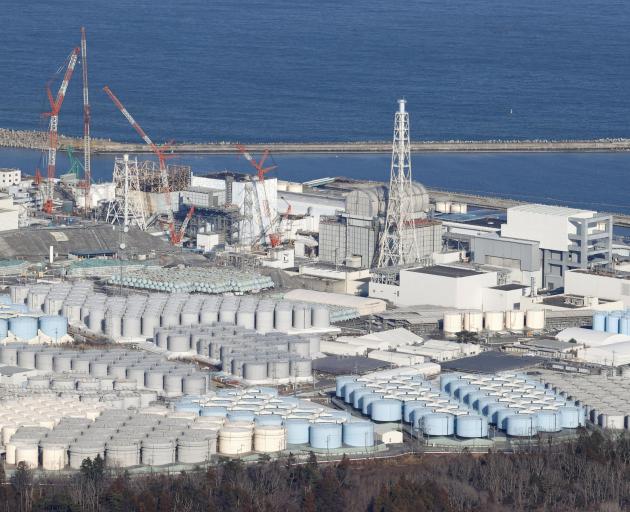
Conservative President Yoon Suk Yeol's government has come under criticism as it defended the position that its own assessment found no problems with the scientific and technical aspects of Japan's plan.
"We intend to hold the Yoon government responsible for failing to do its duties," opposition Democratic Party leader Lee Jae-myung said at a party meeting, calling Japan's plan to discharge water from the Fukushima plant an act of terror.
Japan is set to begin pumping more than 1 million tonnes of treated water from the destroyed Fukushima Daiichi nuclear power plant, a process that will take decades to complete.
The water was distilled after being contaminated from contact with fuel rods at the reactor, destroyed in a 2011 earthquake. Tanks on the site now hold about 1.3 million tonnes of radioactive water - enough to fill 500 Olympic-sized swimming pools.
On Wednesday, public concern remained high in South Korea over the plan to release the treated radioactive water starting at 1pm (Japan time) on Thursday, with a majority of people expressing worry over seafood and ocean contamination, according to surveys.
In a public survey by the pollster Media Research in July, 62% of the people said they would cut back or stop consuming seafood once the discharge goes ahead, despite the South Korean government's assurances to closely monitor the release.
Local governments in South Korea said they would step up radiation tests over seafood to ease consumer concerns. The Seoul metropolitan government said on Wednesday it would carry out daily testing for all seafood at major markets and disclose the results real-time, while South Gyeongsang province plans to livestream its testing.
Democratic Party members and Foreign Minister Park Jin clashed in parliament over the possibility of direct impact to South Korea.
Park said currents will carry the water around the Pacific along the Americas before it reaches South Korea's shores in four years containing less radioactive tritium than normal sea water.
Park also repeated the government's position that its assessment does not necessarily mean it endorses Japan's idea.
Japan has said that the water release is safe. The International Atomic Energy Agency (IAEA) approved the plan in July, saying that it met international standards and that the impact it would have on people and the environment was "negligible".
Documents from the Japanese government and the Fukushima plant operator show that radioactive contaminants will be removed from the water before it is pumped into sea, leaving only traces that are far below regulatory standards.
South Korea said it accepted IAEA's conclusion.
China has been vocal in its opposition, calling the move "extremely selfish" and on Tuesday summoning Japan's ambassador to lodge a diplomatic protest.
Environmental and civic group chapters in the southern regions of neighbouring Japan rallied in protest on Wednesday, assailing Tokyo for threatening fishery products and jeopardising the safety of Pacific countries, according to the Korea Federation for Environmental Movements.
Fisheries industry groups plan to meet this week to review a response, focused on mitigating the expected sharp decline in seafood consumption.
The Democratic Party held a candlelight rally Wednesday evening, followed by a march on Thursday in Seoul toward the presidential office and a public rally on Saturday.
"Japan is about to bring irreversible calamity to South Korea and Pacific rim countries with the release of radioactive contaminated water," Lee said at the party meeting.

Pacific leaders split
Pacific leaders are split over Japan's plans to gradually release the treated nuclear wastewater over a period of 30 to 40 years.
"There's a possibility we may have a splinter on our view on the Fukushima discharge, on the whole, we'll probably find consensus," former Pacific Islands Forum chair and Fiji Prime Minister Sitiveni Rabuka told RNZ in Port Vila.
The International Atomic Energy Agency said the plan met international standards, but not all Pacific leaders were convinced of the project's safety.
Rabuka was optimistic that Pacific countries, particularly those in Melanesia would eventually see eye to eye.
"Traditionally we are together on most issues," Rabuka said.
The Japanese government said it was "not wilfully" trying to divide Pacific nations.
In an effort to pull out this so-called 'splinter' or ease the pain, The Pacific Islands Forum chair and Cook Islands Prime Minister Mark Brown said forum leaders would, "as a matter of priority", consider the latest developments in their next meeting in Rarotonga and Aitutaki in November.
First Foreign Forum Ministers were to meet in September. They too were to discuss the issue.
"We note the IAEA's recommendations that the plans by Japan are consistent with international nuclear safeguards and that impacts on the environment and human health are negligible At the same time, we appreciate the advice rendered by the independent PIF panel of scientific experts."
The advice has been mixed, two of the PIF panellists appointed by the Secritant have said it has been an uphill battle trying to get information from Japan to verify safety. They said there have been "red flags" in the data and one even criticised the IAEA, a move nuclear experts do not take lightly.
The UN nuclear watchdog boss has since defended its position on Japan's wastewater dump.
Other experts on the PIF panel said they had no issue with the release and no harm would come to the Pacific as a result, from a scientific standpoint.
"It is not lost on me that there remains diverging views and responses in the international community, and within our Blue Pacific region," Brown said.
He said, as chair of the PIF, he was committed to maintaining an ongoing dialogue with the government of Japan and the IAEA on this matter.
"As custodians of our Blue Pacific Continent, and in recognition of the transboundary and transgenerational nature of this issue, it is incumbent on all of us to ensure the highest level of due diligence and ongoing monitoring of the planned discharge."

How Japan will release water
WHAT IS JAPAN'S WATER RELEASE PLAN?
The Tokyo Electric Power Company has been filtering the contaminated water to remove isotopes, leaving only tritium, a radioactive isotope of hydrogen that is hard to separate. Tepco will dilute the water until tritium levels fall below regulatory limits before pumping it into the ocean from the coastal site.
Water containing tritium is routinely released from nuclear plants around the world, and regulatory authorities support dealing with the Fukushima water in this way.
Tritium is considered to be relatively harmless because its radiation is not energetic enough to penetrate human skin. When ingested at levels above those in the released water it can raise cancer risks, a Scientific American article said in 2014.
The water disposal will take decades to complete, with ongoing filtering and dilution, alongside the planned decommissioning of the plant.
IS THE WATER SAFE?
Japan and scientific organisations say the released water is safe, but environmental activists argue that all the possible impacts have not been studied. Japan says it needs to start releasing the water as storage tanks are full.
The International Atomic Energy Agency (IAEA), the United Nations' nuclear watchdog, greenlighted the plan in July, saying that it met international standards and that the impact it would have on people and the environment was "negligible".
Greenpeace said on Tuesday that the radiological risks have not been fully assessed, and that the biological impacts of tritium, carbon-14, strontium-90 and iodine-129 - to be released with the water - 'have been ignored'.
The filtering process will remove strontium-90 and iodine-129, and the concentration of carbon-14 in the contaminated water is far lower than its regulatory standard for discharge, according to Tepco and Japanese government documents.
Japan said tritium levels in the water will be below those considered safe for drinking under World Health Organisation standards.
"Meanwhile, it is not the practice of any country to drink the water discharged from nuclear facilities," Japan's mission to the International Atomic Energy Agency said last week.
The government will take "appropriate measures, including immediate suspension of the discharge" if unusually high concentrations of radioactive materials are detected, the document said.
The South Korean government has concluded from its own study that the water release meets international standards and said it respects the IAEA's assessment.
HOW HAVE PEOPLE REACTED?
Tepco has been engaging with fishing communities and other stakeholders and is promoting agriculture, fishery and forest products in stores and restaurants to reduce any reputational harm to produce from the area.
Fishing unions in Fukushima have urged the government for years not to release the water, arguing it would undo work to restore the damaged reputation of their fisheries.
Masanobu Sakamoto, the head of the National Federation of Fisheries Cooperative Associations, said on Monday the group understood the release could be scientifically safe but still feared reputational damage.
Neighbouring countries have also expressed concern. China has been the most vocal, calling Japan's plan irresponsible, unpopular and unilateral. China is the biggest importer of Japanese seafood.
Shortly after the 2011 tsunami and earthquake damaged the Fukushima plant, China banned imports of food and agricultural products from five Japanese prefectures. China later widened its ban to cover 10 out of Japan's 47 prefectures.
The latest import restrictions were imposed in July after the IAEA approved Japan's plans to discharge the treated water.
- Reuters and RNZ












